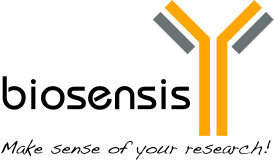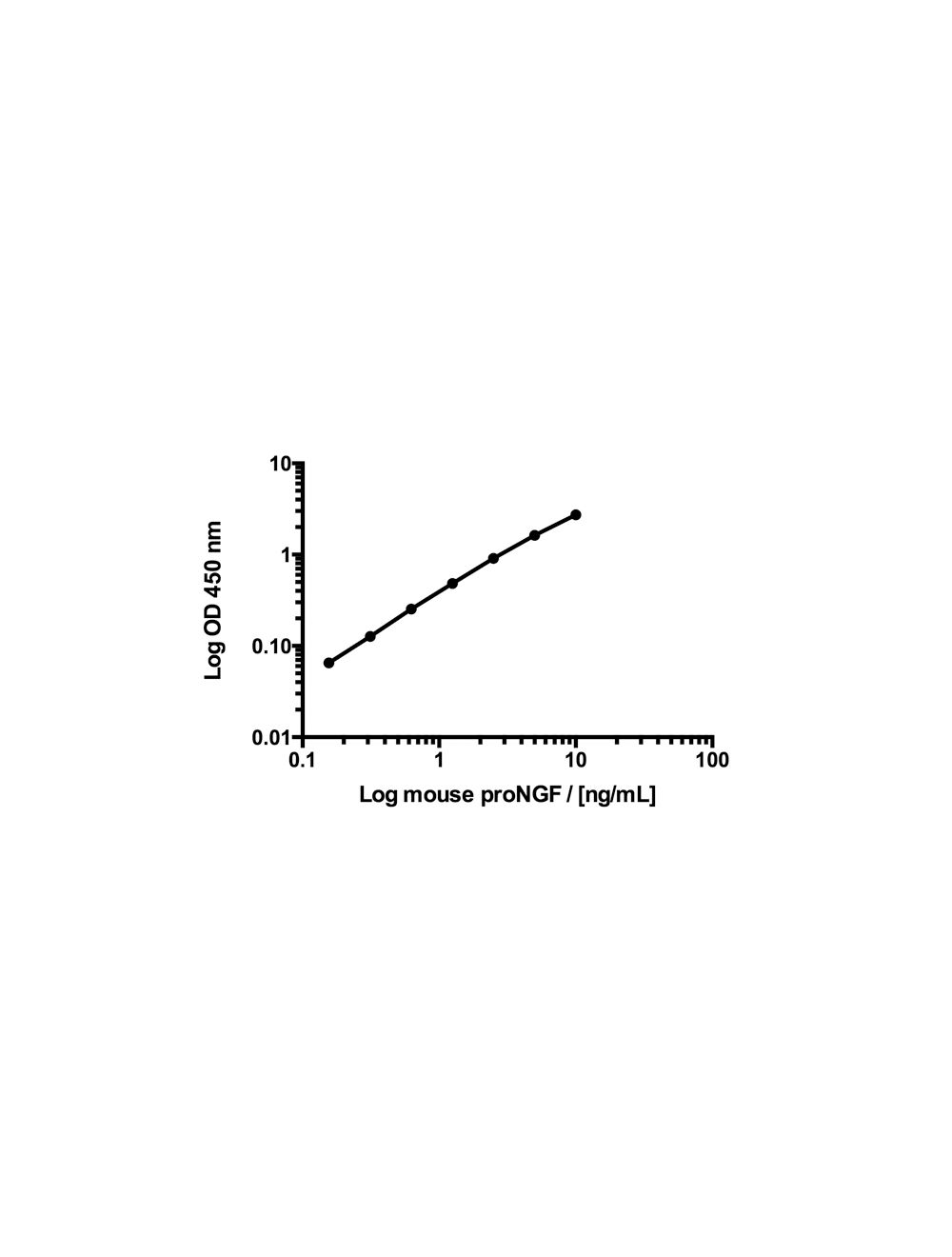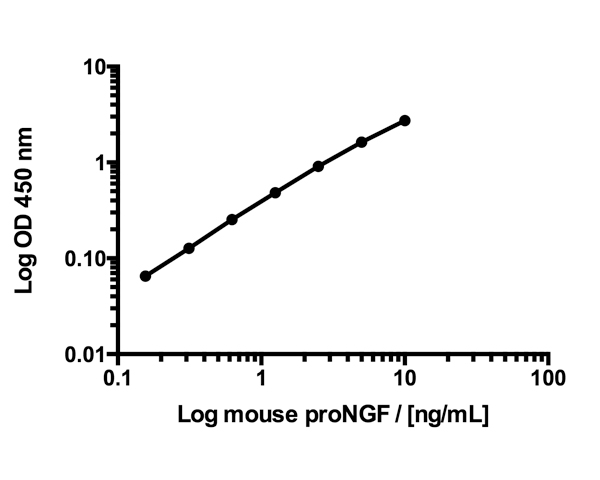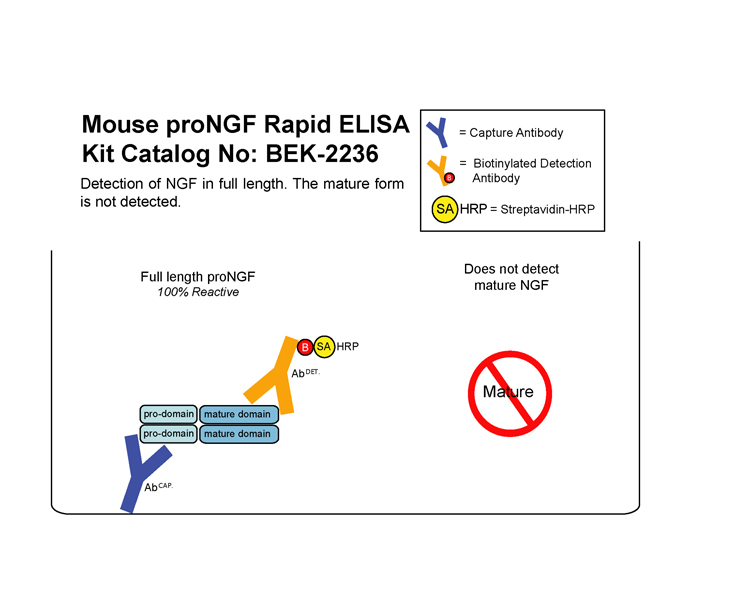Nerve growth factor, pro- (proNGF), Mouse, Rat, Rapid™ ELISA assay
- Product Name Nerve growth factor, pro- (proNGF), Mouse, Rat, Rapid™ ELISA assay
-
Product Description
The Biosensis Mouse and Rat proNGF RapidTM enzyme-linked immunosorbent assay (ELISA) Kit is a sandwich ELISA that allows the quantification of rodent full-length proNGF protein in less than 4 hours in cell culture supernatants and cell lysates only if used as directed. Please refer to the kit protocol for specific use instructions for each substrate application.
This ELISA kit contains a recombinant mouse proNGF standard expressed in E.coli and consists of a pre-coated anti-proNGF capture antibody, a biotinylated anti-NGF detection antibody and horseradish peroxidase (HRP)-conjugated streptavidin. The addition of a substrate (3,3',5,5'-tetramethylbenzidine, TMB) yields a colored reaction product which is directly proportional to the concentration of proNGF present in samples and protein standards.
This ELISA kit is expected to detect rat proNGF due to high degree of homology (96%) with mouse proNGF based on amino acid sequence, and the ability of this kit in detecting proNGF in rat PC12 cell lysates. In the absence of a true rat proNGF standard, results may be expressed as 'mouse proNGF equivalents'.
This ELISA kit shows only 20% reactivity with the human form of proNGF and is therefore not suitable to quantify human proNGF. No cross-reactivity was observed with mature mouse NGF and full-length proBDNF when tested in assay buffer. The antibodies used in this ELISA kit bind epitopes within the pro-domain (capture) and mature domain (detection) of the protein, thus this ELISA assay does not detect the pro-domain peptide.
This kit has not been tested for other applications. Sufficient amount of proNGF standard is supplied to allow for spike- and recovery experiments in order to validate this ELISA assay for other sample matrices if required. This kit has been configured for research use only and is not to be used in diagnostic or clinical procedures. - Alternative Names pro-beta nerve growth factor; proNGF; NGF
- Application(s) ELISA
- Specificity Mouse proNGF. Expected to detect rat proNGF due to high degree of sequence homology. Detects human proNGF (about 20% reactivity). Does not cross-react with proBDNF and mature NGF.
- Species Reactivity Mouse, Rat
- Immunogen Description Recombinant mouse, wild-type proNGF protein, made in E.coli
- Range 0.156 - 10 ng/mL
- Sensitivity Typical limit of detection (LOD) for mouse proNGF is less than 50 pg/mL determined as blank value plus 3x standard deviation of blank OD (n=10).
- Regulatory Status For research use only.
Product Info
-
Product Description
The Biosensis Mouse and Rat proNGF RapidTM enzyme-linked immunosorbent assay (ELISA) Kit is a sandwich ELISA that allows the quantification of rodent full-length proNGF protein in less than 4 hours in cell culture supernatants and cell lysates only if used as directed. Please refer to the kit protocol for specific use instructions for each substrate application.
This ELISA kit contains a recombinant mouse proNGF standard expressed in E.coli and consists of a pre-coated anti-proNGF capture antibody, a biotinylated anti-NGF detection antibody and horseradish peroxidase (HRP)-conjugated streptavidin. The addition of a substrate (3,3',5,5'-tetramethylbenzidine, TMB) yields a colored reaction product which is directly proportional to the concentration of proNGF present in samples and protein standards.
This ELISA kit is expected to detect rat proNGF due to high degree of homology (96%) with mouse proNGF based on amino acid sequence, and the ability of this kit in detecting proNGF in rat PC12 cell lysates. In the absence of a true rat proNGF standard, results may be expressed as 'mouse proNGF equivalents'.
This ELISA kit shows only 20% reactivity with the human form of proNGF and is therefore not suitable to quantify human proNGF. No cross-reactivity was observed with mature mouse NGF and full-length proBDNF when tested in assay buffer. The antibodies used in this ELISA kit bind epitopes within the pro-domain (capture) and mature domain (detection) of the protein, thus this ELISA assay does not detect the pro-domain peptide.
This kit has not been tested for other applications. Sufficient amount of proNGF standard is supplied to allow for spike- and recovery experiments in order to validate this ELISA assay for other sample matrices if required. This kit has been configured for research use only and is not to be used in diagnostic or clinical procedures. -
Related Products
Nerve growth factor (Beta-NGF), Mouse, Rapid™ ELISA assay
Nerve growth factor (Beta-NGF), Rat, Guinea Pig, Rapid™ ELISA assay
Nerve growth factor, pro- (proNGF), Human, Rapid™ ELISA assay
- Application(s) ELISA
- Application Details ELISA. For the quantification of Nerve growth factor, pro- (proNGF) in Culture Supernatant, Cell Lysates, Tissue Homogenates. Please download the detailed product insert for complete instructions for the successful use of this ELISA. Use only as directed.
- Target Nerve growth factor, pro- (proNGF)
- Specificity Mouse proNGF. Expected to detect rat proNGF due to high degree of sequence homology. Detects human proNGF (about 20% reactivity). Does not cross-react with proBDNF and mature NGF.
- Target Cross-Reactivity (ELISA) Reacts with human proNGF (about 20% reactivity). Does not cross-react with proBDNF and mature NGF. Mature NGF spiked into brain homogenate does not interfere with proNGF quantification.
- Target Host Species Mouse
- Species Reactivity Mouse, Rat
- Immunogen Description Recombinant mouse, wild-type proNGF protein, made in E.coli
- Range 0.156 - 10 ng/mL
- Sensitivity Typical limit of detection (LOD) for mouse proNGF is less than 50 pg/mL determined as blank value plus 3x standard deviation of blank OD (n=10).
- Sample Type Cell Lysates, Culture Supernatant, Tissue Homogenates
- Detection Method Colorimetric
- Kit Components The ELISA kit box contains 96-well pre-coated strip plate(s), protein standards, detection reagents, wash and sample buffers, substrate buffer and detailed protocols.
- Storage Instructions Store at 2-8°C.
- Storage Temperature 2-8°C
- Batch Number Please see item label.
- Expiration Date 12 months from purchase.
- Alternative Names pro-beta nerve growth factor; proNGF; NGF
- Uniprot Number P01139
- Uniprot Number/Name P01139 (NGF_MOUSE)
- Scientific Background Nerve growth factor (NGF) is synthesized as a precursor (proNGF) which may be released and have physiological functions to cause cell death. It binds neurotrophin receptor p75 and sortilin and may also be important for the development of nervous system. proNGF is synthesized in target tissues and glia, transported retrogradely and may be released.
- Shipping Statement For order quantities larger than 1 plate, this product is supplied in package units of 2 plates.
- Shipping Temperature 2-8°C (on cold packs)
- UNSPSC CODE 41116158
- Regulatory Status For research use only.
Specifications
-
Specific References
Sirmakesyan S et al. (2023) "Synthesis and secretion of Nerve Growth Factor is regulated by Nitric Oxide in bladder cells in vitro under a hyperglycemic environment" Nitric Oxide. [Epub ahead of print] Application: Rat cell lysates.
Pathare-Ingawale P et al. (2023) Association between proNGF receptors and apoptotic factors in human placentae Placenta. [Epub ahead of print]. Application: Human placental tissue lysates.
Luu BE et al. (2022) Modulation of diabetic kidney disease markers by an antagonist of p75NTR in streptozotocin-treated mice Gene. [Epub ahead of print]. Application: Mouse kidney RIPA homogenates.
Mossa A et al. (2021). Adaptation to partial urethral obstruction in healthy aging LOU rats and the role of nerve growth factor signaling pathway in the bladder. Exp Gerontol. [Epub ahead of print]. Application: Rat urine.
Sugimoto J et al. (2021). Fabry disease-associated globotriaosylceramide induces mechanical allodynia via activation of signaling through proNGF p75NTR but not mature NGF TrkA. Eur. J. Pharmacol. 895. Application: Mouse tissue homogenate (RIPA).
Mossa AH et al. (2020). Antagonism of proNGF or its receptor p75NTR reverses remodelling and improves bladder function in a mouse model of diabetic voiding dysfunction. Diabetologia. [Epub ahead of print]. Application: Mouse bladder extracts (RIPA).
Ryu JC et al. (2018). Role of proNGF/p75 signaling in bladder dysfunction after spinal cord injury. J Clin Invest. [Epub ahead of print]. Application: Mouse urine.

 1800 605-5127
1800 605-5127 +61 (0)8 8352 7711
+61 (0)8 8352 7711


